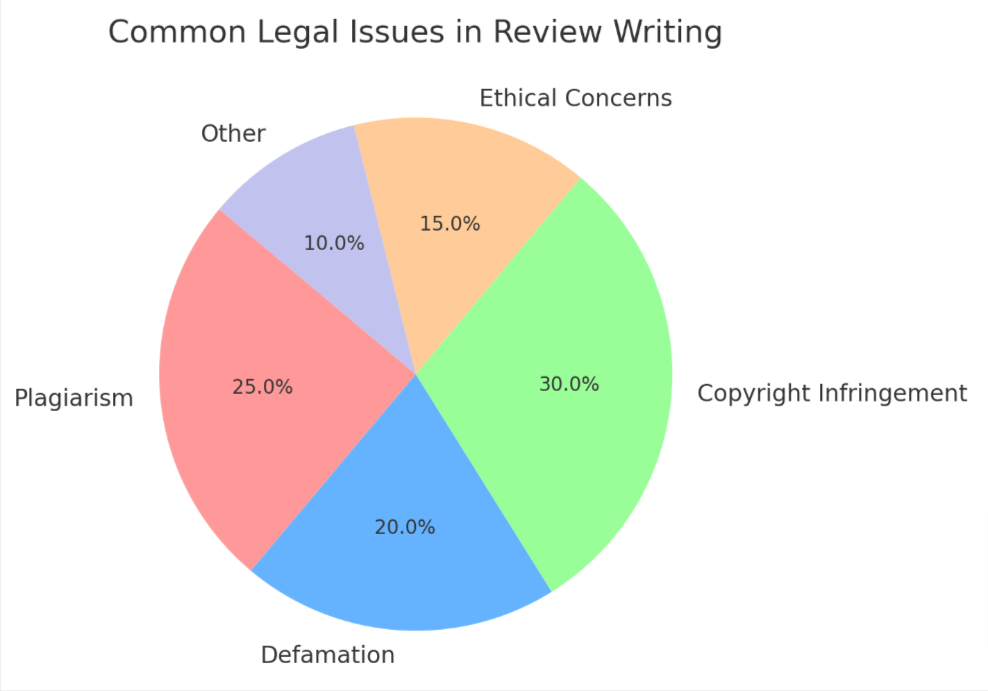Safeguarding Your Work: Legal Aspects of Review Writing
Writing reviews might sound simple, but it’s easy to trip over legal lines. Did you know that one careless phrase could lead to a defamation lawsuit? This post will guide you through the maze of laws and best practices in review writing, keeping your words safe and sound.
Let’s dive in without any trouble!
Key Takeaways
- Always credit original sources to steer clear of plagiarism. Use tools to check for copied material and keep a record of all references to avoid legal trouble.
- Know the laws about defamation and negligent publication. Write honestly and fact – check information to prevent damaging someone’s reputation with false statements.
- Analyze the pros and cons of self – publishing versus traditional publishing, including who controls copyright and how legal issues are handled.
- Start by asking the right legal questions before writing reviews. Get expert feedback during the process to ensure your review follows legal standards.
- When handling negative online reviews, respond professionally first. If you encounter fake or harmful content, consider reporting it and possibly seek legal advice if necessary.
Legal Concerns for Writers
Writers face legal concerns such as plagiarism, credit and copyright issues, defamation, and choosing between self-publishing and traditional publishing. It’s important to understand the legal implications of review writing in order to avoid potential legal issues down the line.
Plagiarism
Plagiarism is a serious legal issue that can land writers in hot water. It means taking someone else’s work and passing it off as your own, which violates copyright laws and tarnishes your reputation.
Creative writers must always credit sources to avoid the accusation of stealing ideas or language. Originality is key in review writing, so using qualitative research methods to gather information will help ensure content is fresh and authentic.
Preventing plagiarism requires diligence and a solid understanding of attribution rules. Use tools designed for plagiarism prevention to scan your work before publication. Documenting and filing all resources you consult makes it easier to provide proper citations.
Always strive for ethical considerations in writing; careful documentation reflects integrity in both review writing and online reputation management.
Credit and Copyright Issues
Credit and copyright issues can trip up even the most careful writers. It’s essential to attribute ideas, quotes, and creative work correctly to avoid accusations of plagiarism. When using someone else’s work, secure permission when necessary and always give proper credit.
This not only respects the original creator but also protects you from legal battles over copyright infringement.
Understanding the difference between fair use and copyright violation is crucial for any writer or reviewer. Writers need to know that they can’t simply copy-paste content; they must rephrase in their own words unless quoting directly—and even then, quotation marks and attribution are non-negotiables.
Mishandling these elements could lead to serious consequences such as lawsuits or damage to your online reputation management efforts.

Defamation and Negligent Publication
Understanding copyright issues is just one part of staying legal in review writing. Moving on to defamation and negligent publication, these are serious concerns that require a writer’s attention.
Defamation occurs when someone writes or says something untrue about another person which could harm their reputation. In the world of review writing, this translates to the need for being honest and fact-based.
Writers must avoid making false statements about individuals or businesses that can be seen as damaging.
Handling information with care is critical to prevent negligent publication claims. This means checking your facts thoroughly before sharing them publicly in reviews or articles. Negligent publication happens when writers fail to verify the truthfulness of their content and proceed to publish it, leading to potential legal trouble if it turns out to be incorrect and harmful.
It’s not enough only to write well; you must also ensure your words do not unintentionally mislead or hurt others’ reputations through careless reporting or analysis.
Self-publishing vs. Traditional Publishing
Self-publishing and traditional publishing present different legal issues for writers. Below is a comparison in HTML table format:
| Self-Publishing | Traditional Publishing |
|---|---|
| Writers retain complete control over content and copyright. | Publishing rights are often transferred to the publisher. |
| Authors are responsible for ensuring the legality of their work. | Publishers typically handle legal vetting of the work. |
| Directly manage and bear the cost of legal issues that arise. | Publishers may assist legally but contracts can limit their liability. |
| Greater freedom can increase the risk of legal oversights. | Experienced editors and legal teams help minimize legal risks. |
| Must understand and comply with libel and copyright laws independently. | Benefit from the publisher’s understanding of complex legal matters. |
| Self-marketing requires careful adherence to advertising laws. | Marketing handled by the publisher, ensuring compliance with laws. |
Writers must weigh these differences carefully. Choosing a publishing route means understanding the associated legal responsibilities.
Managing Legal Reviews for UX Writers
During the kickoff phase, it’s important for UX writers to ask legal questions and address feedback from experts to ensure their reviews are legally sound. For more tips on managing legal reviews, keep reading!
Asking Legal Questions During the Kickoff Phase
Before starting the review writing process, it’s crucial to ask relevant legal questions during the kickoff phase. This will help ensure that your content is compliant and free from any legal concerns. Here are some key questions to consider:
- Clarify copyright ownership for any reference materials or sources you plan to use in your review.
- Determine if there are any specific disclosure requirements for the products or services being reviewed.
- Discuss potential defamation risks and how to mitigate them through accurate and fair assessments.
- Seek guidance on ethical considerations related to the review content and its potential impact on readers.
- Understand the content regulations and publishing laws that may affect the review’s publication.
Addressing Feedback from Experts
After gathering legal insights during the kickoff phase, UX writers must address feedback from experts during the review process to ensure legal compliance and quality of content. Here are key strategies for addressing feedback from experts:
- Incorporate expert feedback thoughtfully by considering their suggestions and ensuring that any changes made do not compromise the legal integrity of the content.
- Communicate openly with experts to clarify any legal concerns or questions about the content, ensuring a collaborative approach in meeting both legal and quality standards.
- Document all interactions with experts and any changes made to the content based on their feedback to maintain a clear record of legal compliance efforts.
- Review and revise content based on expert feedback while keeping a diligent eye on potential legal implications, maintaining an impartial stance in decision-making.
- Seek additional legal guidance if expert feedback raises specific concerns about potential copyright infringement, defamation risks, or other legal issues, ensuring comprehensive compliance measures are in place.
Tips for Handling Negative Online Reviews
Businesses have options for addressing negative reviews, but before taking legal action, it’s important to consider the benefits of responding to bad reviews. Read on to learn more about how to effectively manage negative online feedback.
Options for Businesses to Address Negative Reviews
Businesses can address negative reviews by:
- Responding promptly and professionally to the review, expressing concern and offering a solution.
- Encouraging satisfied customers to leave positive reviews to balance out negative feedback.
- Utilizing reputation management services to monitor and manage online reviews across various platforms.
- Engaging in dialogue with the reviewer to understand their concerns and rectify any misunderstandings.
- Implementing changes based on constructive criticism from reviews to improve products or services.
- Seeking legal advice if a review contains false or malicious information that could harm the business’s reputation.
Before Taking Legal Action
Before taking legal action, it is crucial to consider the potential impact and consequences. Always consult with a legal professional to understand the best course of action for your specific situation.
- Evaluate the nature of the review or content in question to determine if it falls within the scope of legal concerns such as defamation, copyright infringement, or other actionable offenses.
- Gather and preserve evidence including relevant communications, documentation, and any other supporting materials related to the review or content in question.
- Review applicable laws and regulations that pertain to your specific circumstances, ensuring an understanding of your rights and obligations as a writer or business entity.
- Consider alternative dispute resolution methods such as mediation or arbitration before pursuing litigation, which can be time-consuming and costly.
- Assess the potential impact on your online reputation and carefully weigh the benefits and drawbacks of pursuing legal action versus other forms of resolution.
- Carefully document all steps taken leading up to the decision – making process regarding legal action to ensure clarity and transparency throughout the entire process.
- Seek input from trusted advisors or mentors who may provide valuable insights from their own experiences dealing with similar situations.
Dealing with Fake Reviews

Sometimes, negative reviews can be more than just honest feedback. Fake reviews can harm a business’s reputation and need to be handled carefully.
- Identifying Fake Reviews: Look for patterns like multiple similar reviews from different accounts or an unusually high number of negative reviews in a short period.
- Responding to Fake Reviews: Craft a polite response addressing the concerns raised, stating that the experience doesn’t align with the business’s values.
- Reporting Fake Reviews: Platforms like Google and Yelp have policies against fake reviews and provide options to report them for investigation.
- Seeking Legal Counsel: If fake reviews are damaging your business, seek legal advice regarding defamation laws and potential legal action.
- Monitoring Online Reputation: Implement strategies to proactively manage online reputation, such as encouraging genuine positive reviews and engaging with customers online.
The Benefits of Responding to Bad Reviews
Addressing negative reviews in a timely and respectful manner can help businesses demonstrate their commitment to customer satisfaction. Responding to bad reviews can also provide an opportunity to showcase excellent customer service and potentially turn around a negative experience for the reviewer.
By engaging with negative feedback, businesses can show potential customers that they value feedback, are open to criticism, and are willing to make improvements.
Furthermore, responding to bad reviews allows businesses to address any misunderstandings or inaccuracies directly, offering insights into the situation from their perspective. This proactive approach not only helps manage a company’s online reputation but also demonstrates transparency and authenticity.
Conclusion
In conclusion, managing legal reviews for UX writers involves asking important questions early in the process and taking expert feedback seriously. When dealing with negative online reviews, businesses have various options to address them before considering legal action.
Responding to bad reviews can benefit businesses by showing transparency and a willingness to improve. Navigating legal issues in review writing requires careful attention to plagiarism, copyright, defamation, and self-publishing versus traditional publishing considerations.

